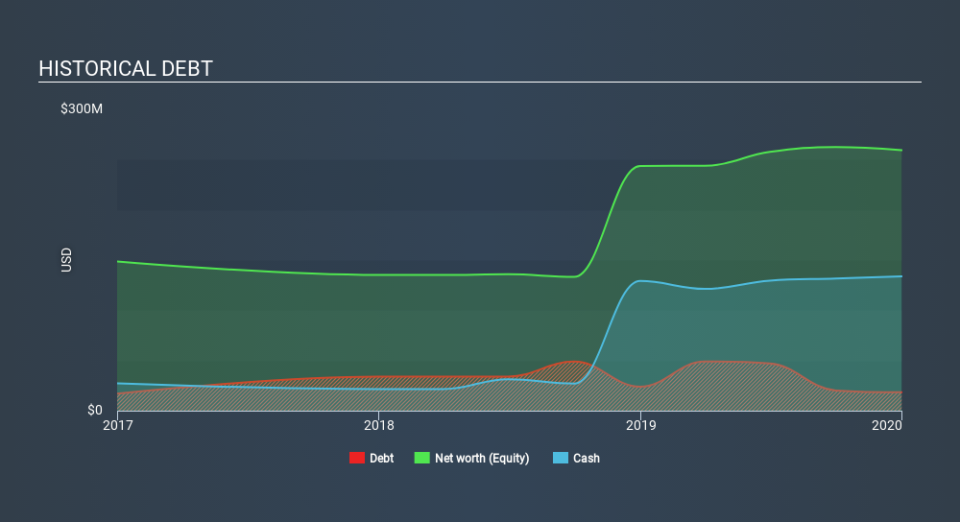Is Upwork (NASDAQ:UPWK) Weighed On By Its Debt Load?

The external fund manager backed by Berkshire Hathaway's Charlie Munger, Li Lu, makes no bones about it when he says 'The biggest investment risk is not the volatility of prices, but whether you will suffer a permanent loss of capital. So it seems the smart money knows that debt - which is usually involved in bankruptcies - is a very important factor, when you assess how risky a company is. Importantly, Upwork Inc. (NASDAQ:UPWK) does carry debt. But should shareholders be worried about its use of debt?
What Risk Does Debt Bring?
Debt is a tool to help businesses grow, but if a business is incapable of paying off its lenders, then it exists at their mercy. Part and parcel of capitalism is the process of 'creative destruction' where failed businesses are mercilessly liquidated by their bankers. However, a more common (but still painful) scenario is that it has to raise new equity capital at a low price, thus permanently diluting shareholders. By replacing dilution, though, debt can be an extremely good tool for businesses that need capital to invest in growth at high rates of return. When we examine debt levels, we first consider both cash and debt levels, together.
View our latest analysis for Upwork
How Much Debt Does Upwork Carry?
As you can see below, Upwork had US$18.3m of debt at December 2019, down from US$23.9m a year prior. But on the other hand it also has US$133.9m in cash, leading to a US$115.6m net cash position.
How Healthy Is Upwork's Balance Sheet?
According to the last reported balance sheet, Upwork had liabilities of US$149.1m due within 12 months, and liabilities of US$37.9m due beyond 12 months. On the other hand, it had cash of US$133.9m and US$30.2m worth of receivables due within a year. So its liabilities outweigh the sum of its cash and (near-term) receivables by US$22.9m.
Of course, Upwork has a market capitalization of US$959.2m, so these liabilities are probably manageable. But there are sufficient liabilities that we would certainly recommend shareholders continue to monitor the balance sheet, going forward. Despite its noteworthy liabilities, Upwork boasts net cash, so it's fair to say it does not have a heavy debt load! There's no doubt that we learn most about debt from the balance sheet. But ultimately the future profitability of the business will decide if Upwork can strengthen its balance sheet over time. So if you want to see what the professionals think, you might find this free report on analyst profit forecasts to be interesting.
In the last year Upwork wasn't profitable at an EBIT level, but managed to grow its revenue by 19%, to US$301m. That rate of growth is a bit slow for our taste, but it takes all types to make a world.
So How Risky Is Upwork?
Statistically speaking companies that lose money are riskier than those that make money. And we do note that Upwork had negative earnings before interest and tax (EBIT), over the last year. Indeed, in that time it burnt through US$16m of cash and made a loss of US$17m. But the saving grace is the US$115.6m on the balance sheet. That kitty means the company can keep spending for growth for at least two years, at current rates. Summing up, we're a little skeptical of this one, as it seems fairly risky in the absence of free cashflow. The balance sheet is clearly the area to focus on when you are analysing debt. But ultimately, every company can contain risks that exist outside of the balance sheet. Case in point: We've spotted 2 warning signs for Upwork you should be aware of, and 1 of them doesn't sit too well with us.
Of course, if you're the type of investor who prefers buying stocks without the burden of debt, then don't hesitate to discover our exclusive list of net cash growth stocks, today.
If you spot an error that warrants correction, please contact the editor at editorial-team@simplywallst.com. This article by Simply Wall St is general in nature. It does not constitute a recommendation to buy or sell any stock, and does not take account of your objectives, or your financial situation. Simply Wall St has no position in the stocks mentioned.
We aim to bring you long-term focused research analysis driven by fundamental data. Note that our analysis may not factor in the latest price-sensitive company announcements or qualitative material. Thank you for reading.

 Yahoo Finance
Yahoo Finance 
